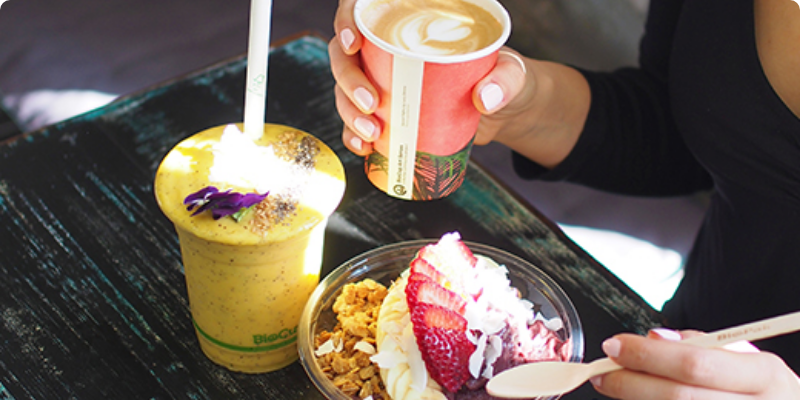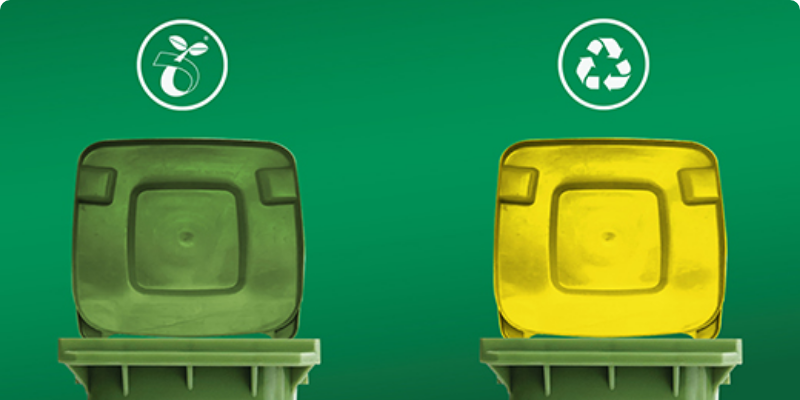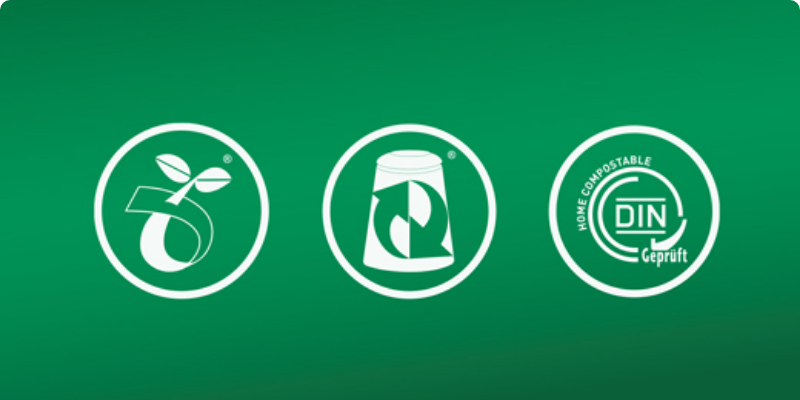How to dispose of your BioPak packaging

Choose a Product to See Your Options
BioPak packaging is better for the environment at its outset. Our packaging range is made from rapidly renewable, plant-based resources (rather than fossil-based resources like traditional packaging). So even if it is sent to landfill, it’s a more sustainable option than using conventional plastic.


Industrial Composting
PLA lined paper cups and boxes can be composted in industrial facilities. Some councils offer residential Food Waste collections that accept compostable packaging. Please check with your council or visit Compost Connect to find a business near you that uses a compost service.
If you’re a business, you can join Compost Connect, a not-for-profit composting initiative connecting foodservice businesses to commercial organic waste pick-up services.
Compost Certifications
Our Paper BioCups and BioBoard range are certified industrially compostable to Australian AS4736 and European EN13432 standards.




Home Composting
The Ingeo™ PLA bioplastic lining that we use for our paper cups and boxes is not certified home compostable as it does not biodegrade in home compost conditions within the testing timeframe.
We have documented these cups successfully compost in a home compost simulation, however, as conditions are variable a certification cannot be issued.
If you’re looking for a certified home compostable coffee cup solution, discover our aqueous-lined cups!


Recycling
Under the On-Pack Recycling Label (OPRL) program BioPak’s PLA-lined paper boxes and containers are suitable for recycling along with cardboard, as long as it’s clean and no food residue remains. Recycling is a good end-of-life solution, check with your local council to find out more and stay updated with the latest recycling information.
However, under the On-Pack Recycling Label (OPRL) program BioPak’s PLA-lined coffee cups and cold paper cups are marked as not recyclable.
The OPRL is an independent not-for-profit tool that verifies what packaging is or isn’t recyclable in the UK recycling collections.


Industrial Composting
Our BioCane plant fibre packaging with no added PFAS can be composted in industrial facilities. Some councils offer residential Food Waste collections that accept compostable packaging. Please check with your council or visit Compost Connect to find a business near you that uses a compost service.
Some of our plant fibre range contains added PFAS which are not certified and can’t be composted. We are working to remove PFAS by the end of 2023. Learn more about PFAS.
Compost Certifications
Products like our Plant Fibre BioCup Lid and Plant Fibre Cutlery with no added PFAS are industrially compostable to Australian AS4736 and European EN13432 standards. Check each individual product for specific details.




Home Composting
Our BioCane plant fibre packaging with no added PFAS is certified home compostable. They can be composted in your backyard compost.
Some of our plant fibre range contains added PFAS which are not certified and can’t be composted. We are working to remove PFAS by the end of 2023. Learn more about PFAS.
Compost Certifications
Products like our Plant Fibre BioCup Lid and Plant Fibre Cutlery with no added PFAS are home compostable to Australian (AS5810) and European (NF T51-800) standards. Check each individual product for specific details.




Recycling
Under the On-Pack Recycling Label (OPRL) program BioPak’s plant fibre packaging is marked as not recyclable.
The OPRL is an independent not-for-profit tool that verifies what packaging is or isn’t recyclable in the UK recycling collections.



Industrial Composting
Aqueous-lined paper cups can be composted in industrial facilities. Some councils offer residential Food Waste collections that accept compostable packaging. Please check with your council or visit Compost Connect to find a business near you that uses a compost service.
If you’re a business, you can join Compost Connect, a not-for-profit composting initiative connecting foodservice businesses to commercial organic waste pick-up services.
Compost Certifications
Aqueous lined paper cups are certified industrially compostable to European EN13432 standards, and will soon be certified industrially compostable to Australian AS4736 standards.



Home Composting
Our aqueous-lined biocups are certified home compostable to Australian (AS5810) and European (NF T51-800) standards. These cups are food safe, odourless, and can be disposed of right in your backyard compost bin!




Recycling
Aqueous is an innovative material recently introduced to lining paper cups. These cups can be recycled without requiring any special facilities or treatments. Just rinse them as you would with any recyclable item. If they are not heavily contaminated by food or drink, you can place them in the paper or cardboard recycling bin. They undergo the same recycling processes as other recyclable cardboard or paper items.
If you are a business with a specialist cup collection, be sure to consult your supplier regarding the designated bin for disposing of aqueous cups.


Industrial Composting
Our 100% paper products can be composted in industrial facilities. Some councils offer residential Food Waste collections that accept compostable packaging. Please check with your council or visit Compost Connect to find a business near you that uses a compost service.
If you’re a business, you can join Compost Connect, a not-for-profit composting initiative connecting foodservice businesses to commercial organic waste pick-up services.


Home Composting
100% paper products can be composted in your home compost.
They’re a source of carbon which can help maintain the carbon-nitrogen balance of your compost pile.
Our paper products have passed a worm toxicity test (meaning they aren't toxic to worms or soil). This is a requirement to gain an Australian home compostable certification.




Recycling
100% paper is recyclable in the paper recycling stream. However, it needs to be fairly clean, which is not always the case with food packaging. Unlined BioBoard, paper bags and straws are accepted in the recycling stream, but not napkins.
Recyclability is verified by the On-Pack Recycling Labler scheme (OPRL) - an independent not-for-profit tool that verifies what packaging is or isn’t recyclable in the UK recycling collections.



Industrial Composting
Our wood products can be composted in industrial facilities. Some councils offer residential Food Waste collections that accept compostable packaging. Please check with your council or visit Compost Connect to find a business near you that uses a compost service.
If you’re a business, you can join Compost Connect, a not-for-profit composting initiative connecting foodservice businesses to commercial organic waste pick-up services.


Home Composting
BioPak’s wooden cutlery can be composted in your backyard compost.
Our wooden cutlery is made from FSCTM certified birchwood, and our coated range has been coated with a food-safe, non-toxic, compostable plant-based carnauba wax.
They’re a source of carbon which can help maintain the carbon-nitrogen balance of your compost pile.


Recycling
Wood products are not accepted in mixed or paper recycling streams. The best end-of-life solution is composting.
We’ve marked them here as not recyclable in alignment with the On-Pack Recycling Label (OPRL) program – an independent not-for-profit tool that verifies what packaging is or isn’t recyclable in the UK recycling collections.


Industrial Composting
Clear PLA products and PLA hot cup lids can be composted in industrial facilities. Some councils offer residential Food Waste collections that accept compostable packaging. Please check with your council or visit Compost Connect to find a business near you that uses a compost service.
If you’re a business, you can join Compost Connect, a not-for-profit composting initiative connecting foodservice businesses to commercial organic waste pick-up services.
Compost Certifications
Clear PLA products and PLA hot cup lids are certified industrially compostable to Australian AS4736 and European EN13432 standards.




Home Composting
The hard bioplastic we use in our clear cups, clear lids and hot cup lids is not certified home compostable as it does not biodegrade in home compost conditions within the testing time frame.


Recycling
Hard bioplastic products are not accepted in the mixed recycling stream. While bioplastic is technically recyclable, large scale infrastructure to process PLA (material category 7) is not well established. Therefore, the best end-of-life solution is through commercial composting.
We’ve marked them here as not recyclable in alignment with the On-Pack Recycling Label (OPRL) program – an independent not-for-profit tool that verifies what packaging is or isn’t recyclable in the UK recycling collections.


Industrial Composting
Where compostable plant-based lids are not as functional, still very expensive, or the raw material is in short supply, we offer a very limited range of plastic alternatives. These will be phased out by 2025.
At BioPak, we’re always looking for better and more innovative replacements. All of our fossil-based plastic products are well-marked and not compostable.


Home Composting
Where compostable plant-based lids are not as functional, still very expensive or the raw material is in short supply, we offer a very limited range of plastic alternatives. These will be phased out by 2025.
At BioPak, we’re always looking for better and more innovative replacements. All of our fossil-based plastic products are well-marked and not compostable.


Recycling
In many cases, our fossil-based plastic lids are recyclable in alignment with the On-Pack Recycling Label (OPRL) program – an independent not-for-profit tool that verifies what packaging is or isn’t recyclable in the UK recycling collections.
Take note, plastic should not be contaminated with food and black lids are currently not accepted in the recycling stream.

At a Glance: What to Do With Compostable Packaging
First, look for proof through certifications. To gain an industrially compostable certification (EN13432) or home compostable certification (NFT51-800) products need to undergo rigorous testing and hold a compostability licence number.
In Europe, the trusted certification bodies that do that are the TÜV Rheinland Group and DIN CERTCO. On their website, they both have a list of companies and products that are certified. Check the TÜV website and DIN CERTCO website for more information.
To check if a product is certified, look for one of these two logos AND the company’s sub-licence number stated underneath.
Industrially Compostable (EN13432)
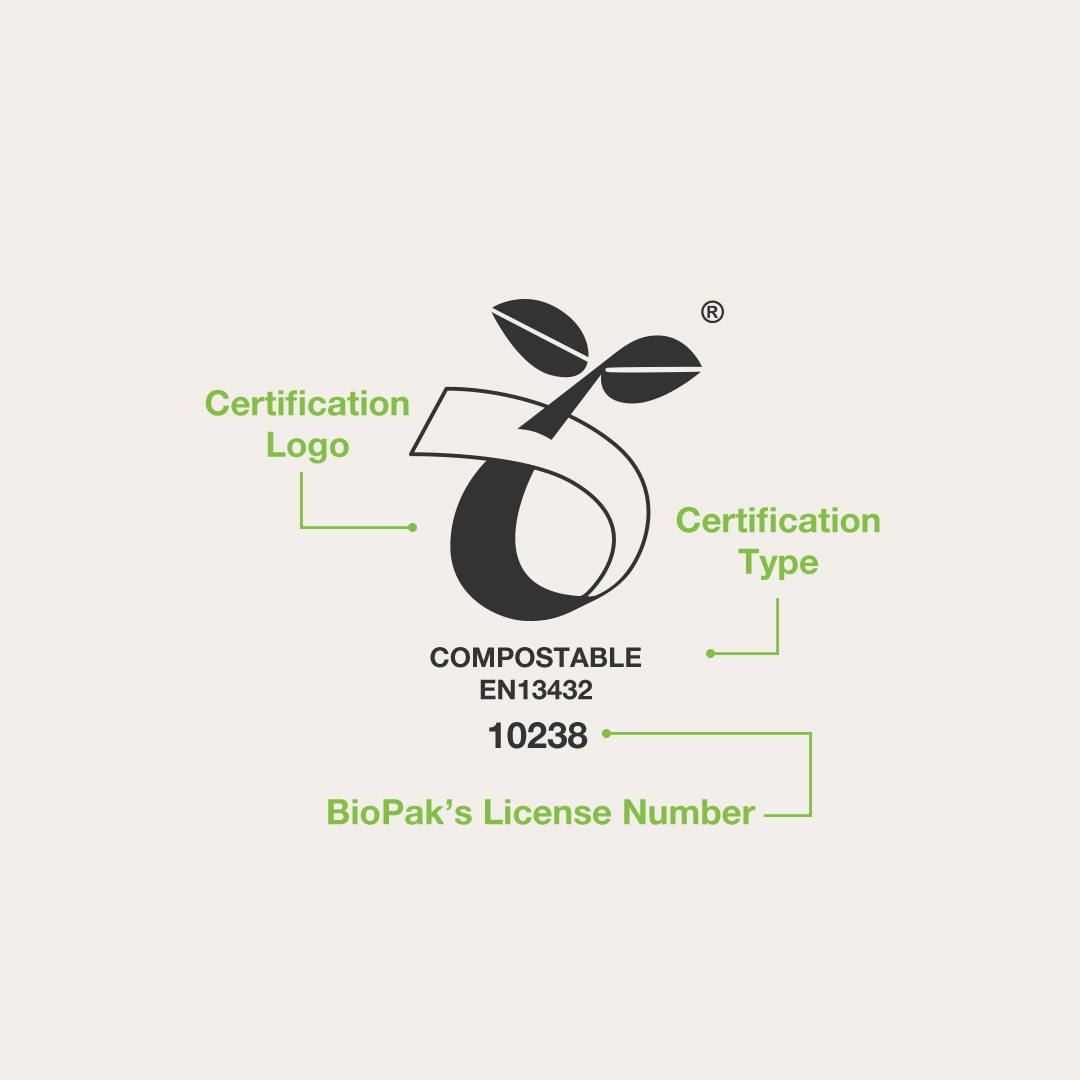

Home Compostable (NF T51-800)
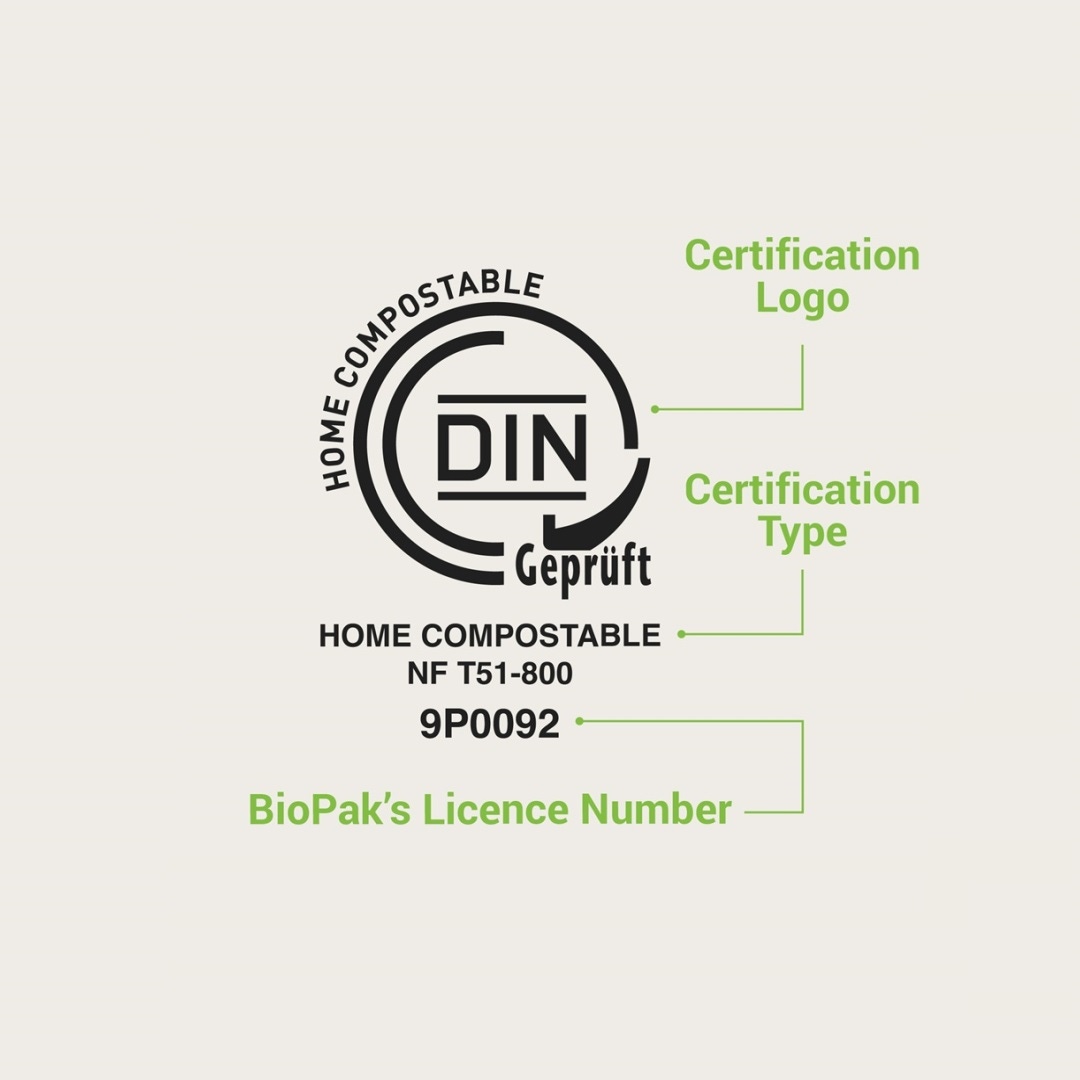

Does a Composting Certification Really Matter?
Yes! You should always look for composting certifications from trustworthy certification bodies – like TÜV Rheinland Group and DIN CERTCO. To get these certifications, products have to undergo stringent, time-consuming and costly test regimes.
If a product doesn’t hold this certification, it could be greenwashing, which can lead to packaging failing to break down in a compost environment and contamination. Certifications are the only way to know if a product truly is what it says it is.
This is why we – as consumers – should always trust and support products showing the correct logos.
Signs of Greenwashing – Incorrectly Used Compostable Logos
By understanding the compostable logos (and spotting any false claims that fall outside of this) consumers can take a stand against greenwashing.
Here are a few examples of incorrectly used compostable logos.
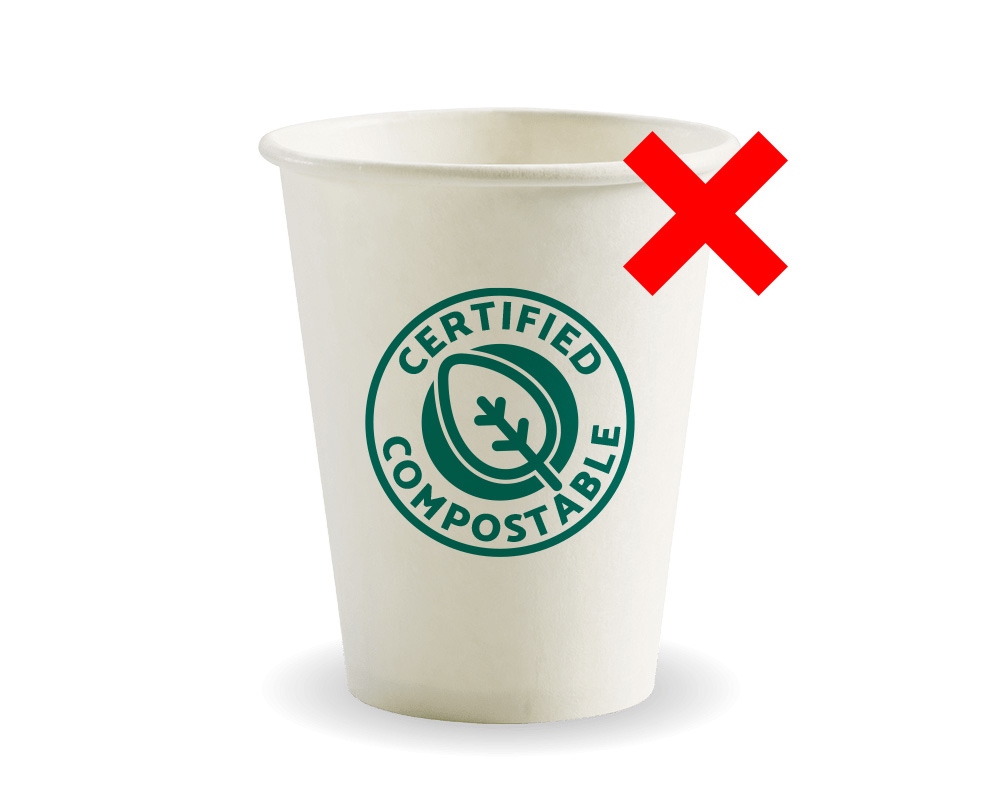

In this example, a company has made their own ‘certified compostable logo.’ This is greenwashing and not verified by the ABA.
At BioPak, our compostable products are always certified under the ABA.
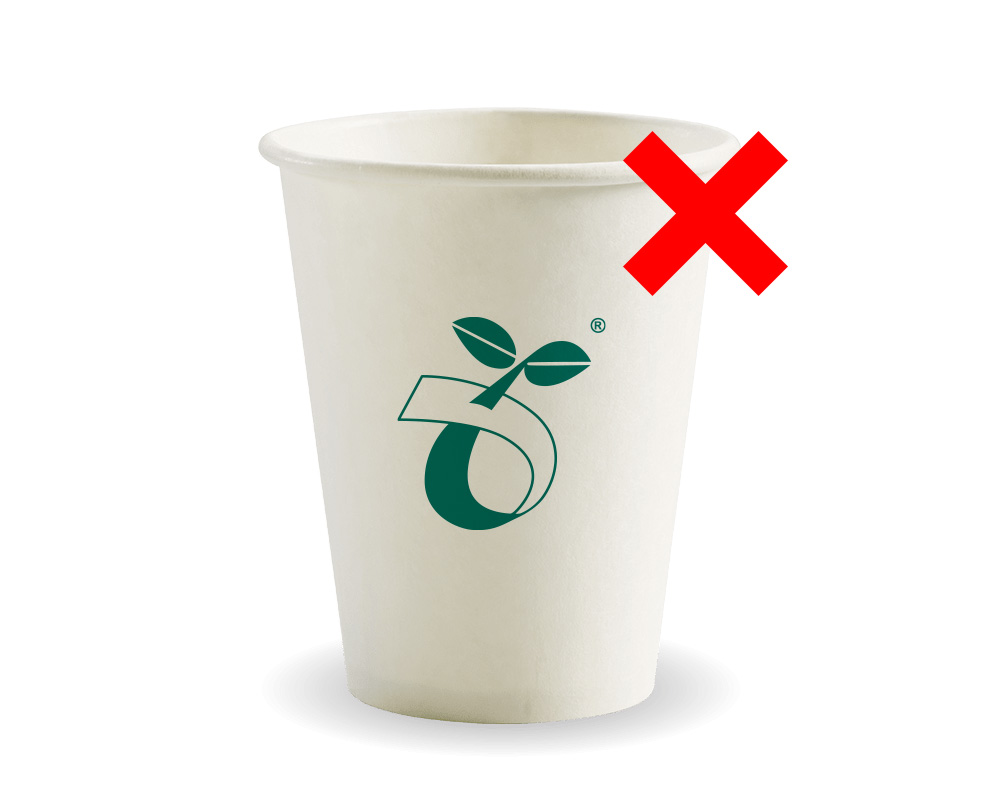

In this example, the company has used the seedling logo but doesn’t have a certification number beneath it. This makes it unclear for the consumer on how to correctly dispose of the product.
At BioPak, we make our certification numbers available either on the product or on our website, when applicable.
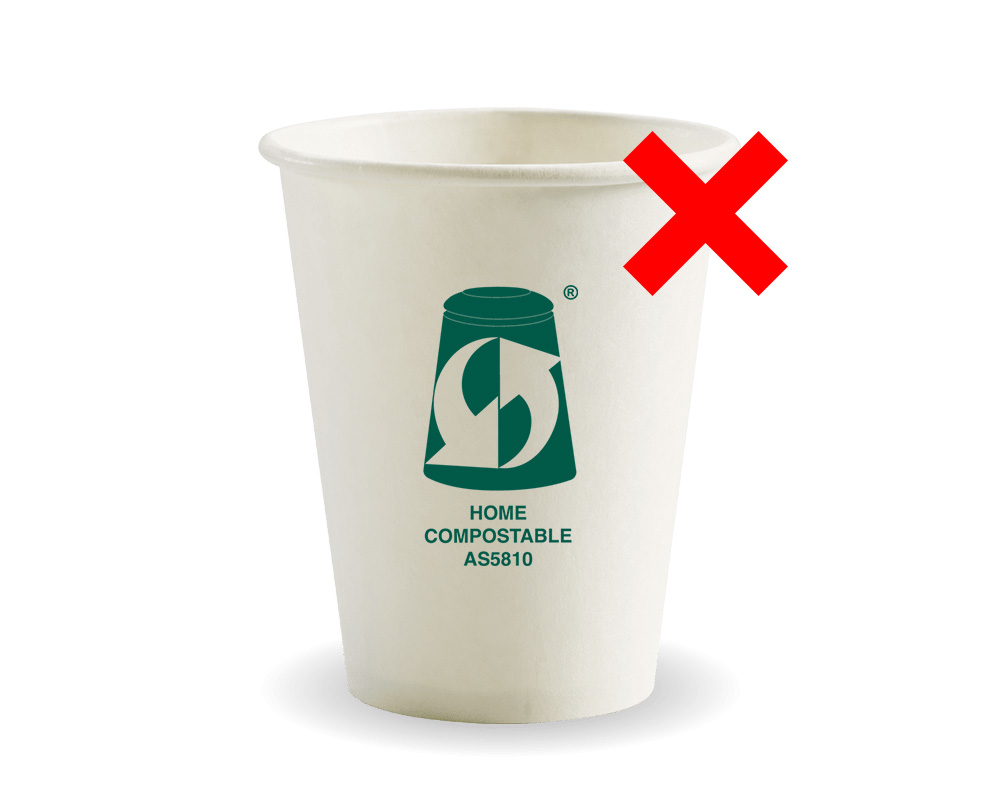

In this example, the company has used the seedling logo and the certification number. However, there’s no company licence number beneath it. This makes it hard to know whether they’re actually certified.
At BioPak, we make our certification numbers available either on the product or on our website, when applicable.
What Recycling Labels Should You Look For to Know the Truth?
You should always look for the On-Pack Recycling Labels (OPRL logos) developed by an independent not-for-profit organisation that verifies what packaging is or isn’t recyclable in the UK recycling collections.


RECYCLE
This label is applied to packaging collected by 75% or more of UK local authorities and then sorted, processed and recycled into new packaging or products.
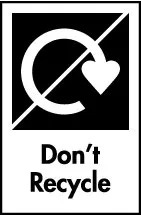

DON’T RECYCLE
This label is applied to packaging collected by less than 50% of UK local authorities and/or is not able to be sorted, processed and recycled into new packaging or products.
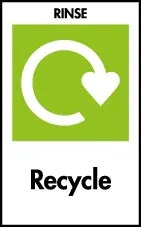

RECYCLE | RINSE
Rinsing recyclable packaging, like yoghurt pots and soup tins, ensures that any food or product residue doesn’t contaminate other materials, particularly if they are collected together with paper.
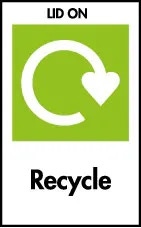

RECYCLE | RINSE | LID ON
Caps and lids under 40mm in diameter are too small to be captured for recycling, they fall through the holes in the screens at the sorting facilty. If you see this label, putting the lid back on the bottle packaging will help it to be captured and recycled.
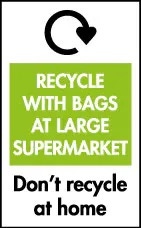

RECYCLE WITH BAGS AT LARGE SUPERMARKETS | DON'T RECYCLE AT HOME
You can see this label on plastic wrapping such as bread bags, fruit and veg bags, crisp packets and chocolate wrappers. You can recycle this type of packaging at recycling points in selected supermarkets.
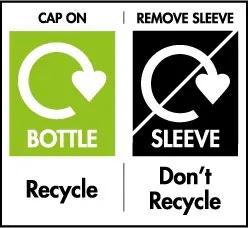

RECYCLE | BOTTLE CAP ON | DON'T RECYCLE | REMOVE SLEEVE
Some packaging components need separating before you dispose of them. You may see a label like this on packaging where a sleeve, film or liner can be easily removed from the main packaging item. In this case, the sleeve is removed from a bottle by pulling a perforated strip, the bottle can be recycled but the sleeve goes in the rubbish.
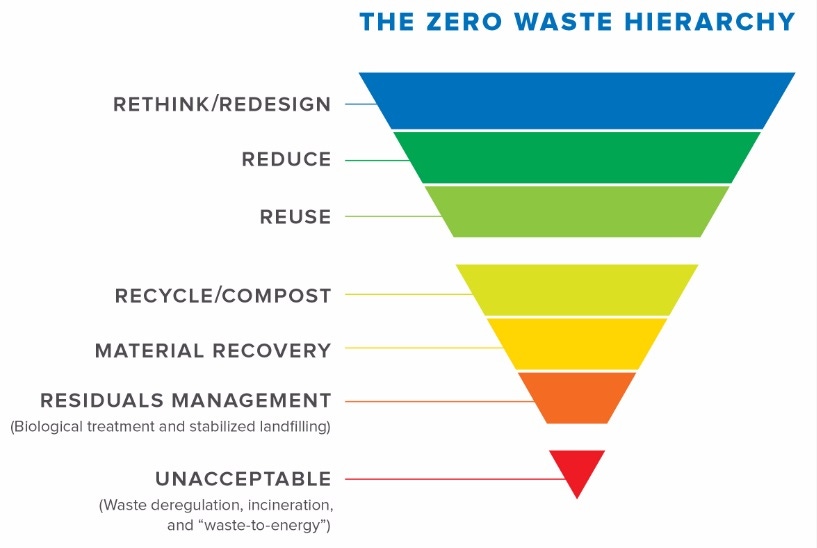

Why Is Composting the Best Recycling Choice for Foodservice Packaging?
Traditional recycling of paper, metal, plastic and glass is often difficult in the foodservice industry, because it’s either too small to be sorted by recycling plants, is usually contaminated with food, or is made of various materials that can’t be separated easily.
At BioPak, we see composting as the ideal end-of-life option for foodservice packaging. That’s because it acts as a vehicle to help curb food waste – packaging and food waste can all go in one bin, the organic waste bin, to be composted industrially.
Not only that, food waste emits methane in landfill, a greenhouse gas on average 28 times more potent than CO2. Composting helps avoid these emissions, while creating a nutrient-rich resource that can improve soil quality!
What Happens if BioPak Packaging Ends Up in Landfill?
Landfill isn’t the ideal place for BioPak’s compostable packaging to end up (organic waste in a landfill environment emits methane, a potent greenhouse gas).
However, we recognise that right now, it’s inevitable that some of our products end up in landfill, this is largely due to the limited infrastructure and accessibility to compost facilities.
Compostable packaging going to landfill is still better than the alternative: traditional plastic packaging going to landfill. That’s because traditional plastic packaging is made from energy-intensive, fossil-based resources, whereas compostable packaging is made from rapidly renewable, plant-based resources, so it’s a more sustainable production process. For example, the production of Ingeo™ PLA bioplastic produces 80% less greenhouse gas emissions compared to conventional plastic derived from fossil resources.
If you’re a foodservice business and want to start diverting your food waste and BioPak packaging from landfill, sign up to Compost Connect.
Start Composting at Your Foodservice Business
Compost Connect is a not-for-profit platform connecting foodservice businesses to commercial organic waste pick-up services. Compost Connect is powered by First Mile, providing a pay-as-you-go service, making compostable packaging collections more accessible across the food service sector.
We launched Compost Connect to take responsibility for where our packaging ends up. Food and organic waste decomposing in landfill emits methane, a greenhouse gas that’s on average 28 times more potent than CO2. By joining Compost Connect, you’ll be diverting waste from landfill, reducing emissions, showing your commitment to environmental sustainability, and turning your food and packaging waste into nutrient-rich compost!


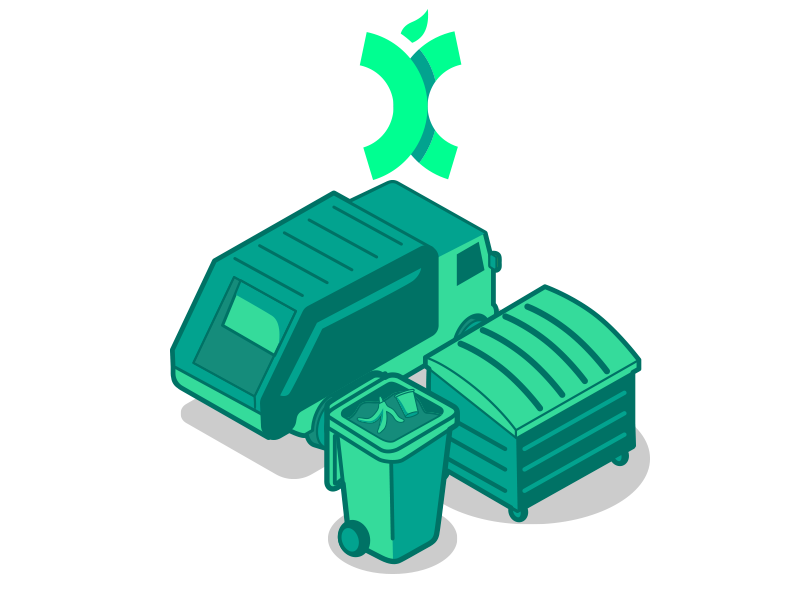

Learn More
-
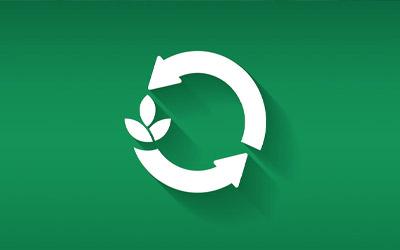 What Is The Circular Economy? Let’s Rethink Packaging.
What Is The Circular Economy? Let’s Rethink Packaging.Learn about a circular economy and how it relates to foodservice packaging.
Learn more -
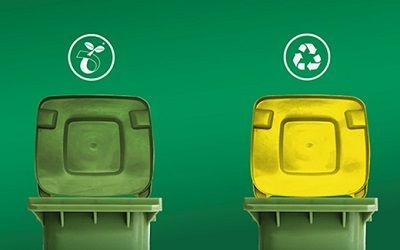 Compostable vs Recyclable: Which Is Better for the Environment?
Compostable vs Recyclable: Which Is Better for the Environment?Which is better for the environment, composting or recycling?
Learn more -
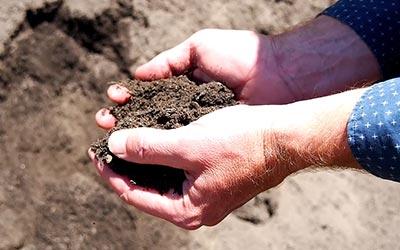 What Are the Different Types of Composting?
What Are the Different Types of Composting?Learn about the different types of home and industrial composting methods.
Learn more









